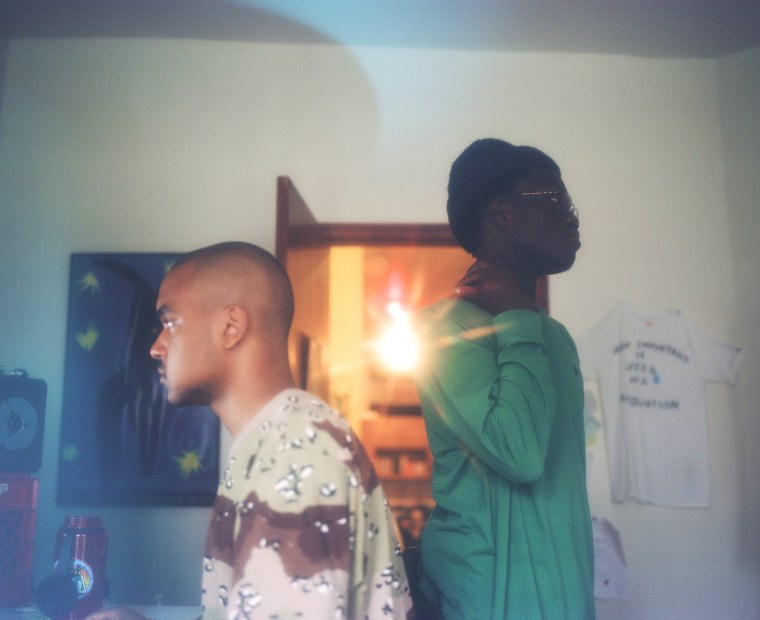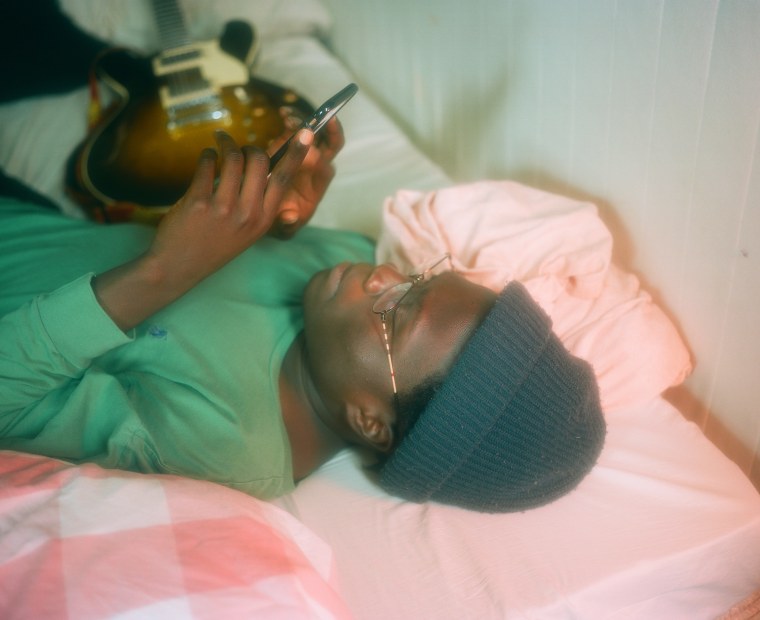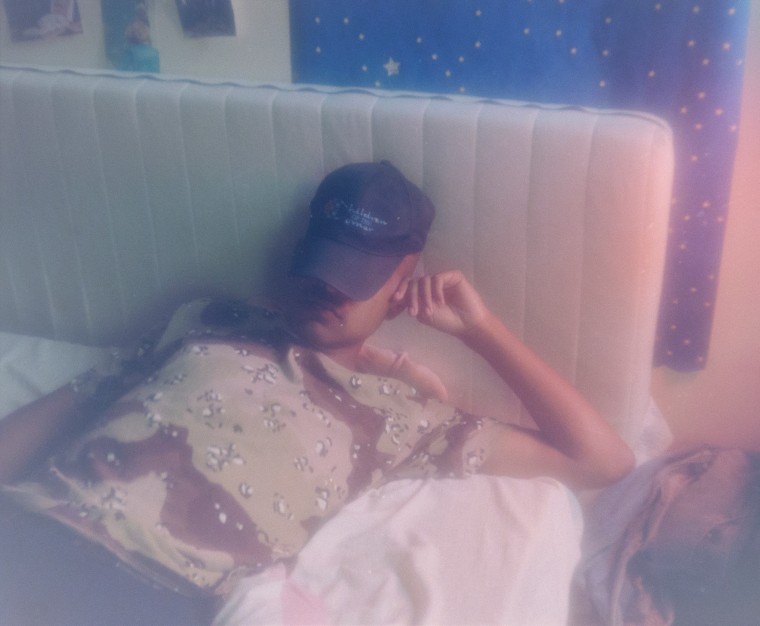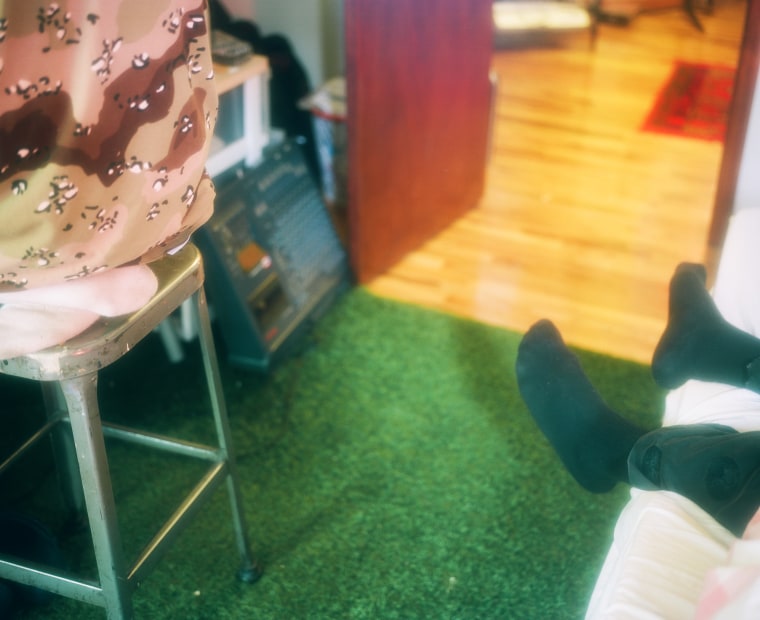 Slauson Malone (left) and MEDHANE (right) of Medslaus.
Photo by Devil Claro.
Slauson Malone (left) and MEDHANE (right) of Medslaus.
Photo by Devil Claro.
On a Sunday evening in late May, a stoked clump of young adults spilled onto the sidewalk in front of The Good Company, a clothing store/clubhouse on New York City’s Lower East side. Walking up to the shop was to enter a welcoming bubble of geeked smiles and infectious camaraderie, all soundtracked by screeching cars, loud laughs, and stifled jams struggling to break out beyond the storefront’s glass window. Inside the shop, local duo Medslaus was holding the listening party for Poorboy, their second collaborative album. It was an energetic and proudly collaborative atmosphere; while the tape played, a mic was passed around for shoutouts and impromptu verses.
That same collaborative spirit, gut-filling euphoria, and frenetic energy emanates from Poorboy at every turn. Masterminded by New York rapper MEDHANE and New York-via-Los Angeles producer Jasper Marsalis a.k.a Slauson Malone, the follow-up to 2015’s Greys In Yellow, premiering in full today on The FADER, explores what it might mean to be a smart, broke, but spirited twentysomething who’s just trying to get to the bag and make it. Opening track “Cold 2” captures the crossroads of knowing your purpose but still feeling lost, “WONTBLEEDME!” is a wild mind-fuck that’s so wrong it’s right, and “8 24” breaks down the internal turmoil that comes with chasing a check on your own terms. The album is full — jazzy, soulful, and cacophonous. It’s beautifully New York, but still for everyone.
We recently caught up with MEDHANE and Slauson Malone to talk about how their album was a true testament to collaboration with friends, why it’s important that sometimes things sound bad, and what it’s like to be a part of N.Y.C.’s music scene right now. Listen to Poorboy below, and download your own copy right here.
How did y’all each get into making music?
MEDHANE: I saw a lot of hip-hop movies [growing up], and was super exposed to hip-hop shit. My mom showed me Beat Street, where it’s got breakdancing and the five elements of hip-hop. At first I tried to do graffiti, then I tried to breakdance when I was around 11. I never really got into DJing but my dad DJs. One day, senior year of high school, I just came home and recorded a track on GarageBand, and I was like “Nah, I’m gonna keep doing this.” And now we’re here.
SLAUSON MALONE: I got into music through wanting to be an electro-house producer, an electro-dance DJ. I met this man named Alex and he was like “This is what you gotta do, buy an MPC,” and do all this shit. So it definitely came out of DJing. Another reason was because I’d find something I’d be upset by in music, and think, “OK, if I were to make something, I would change this.” I also listen to a lot of different genres of music.
Were you also encouraged by your dad?
MALONE: My dad's super anti-rap. His issue is mainly with backbeats; he feels that there’s a structural issue with rap because it’s so repetitive. I wasn’t allowed to play music in the house past a certain volume, and if it passed that it [went] static. I guess that kind of was a drive for me to make more music as a young child.
What’s the significance of the Poorboy title and concept?
MALONE: There’s a poem that my friend Nathanael Cox wrote. He’s a writer and has a blog called The Cane And Machete. I tried to explain what the concept of the album was to him, and he was inspired by it, and [he wrote] the “Poorboy” poem.
MALONE: There were also a lot of conversations I had with Mehdane around our first album Greys In Yellow. It’s super angsty and internal, like “Why!!” and “I’m upset!” — but not offering any kind of reasons. We were thinking, how do we make an album that is personal to us, but also reflects issues outside of us?
MEDHANE: A bunch of people have asked me, “Is this about you? Are you Poorboy?” I’m like Nah, this isn’t about me, this isn’t about Jasper — it’s kind of like a symbol for people in general. Everybody is trying to get paid. In rap, and in music in general, there’s a lot of materialism, for lack of a better word. I was trying to address that. A lot of the time, on the way to getting the money or whatever thing you want to get, other things come in and fuck you up.
 MEDHANE.
Photo by Devil Claro.
MEDHANE.
Photo by Devil Claro.
While making the album, you guys weren’t always able to work together in person. Where were you both, and was working remotely beneficial?
MALONE: In our respective schools, beds. I was in my room in New York, and he was in his room in Pittsburgh. From my perspective, it was better that were were farther away from one another. Like, you know when you’re like “man, I wanna beat his ass,” but you can’t actually see that person? I feel like it worked to our advantage. We had to go through a bunch of different drafts. The distance is kind of what makes the album hot too, because, even though you’re hearing one song, it’s comprised of multiple sessions. Like the session that we had with Max was a year ago and recorded in L.A, with Mehdane’s verse recorded in the Bronx.
MEDHANE: The album is like one big collaboration for real. It’s a collaboration between all of us.
MALONE: A lot of the instrumentation, complete credit goes to Gio. Him and I are Standing On The Corner. He inspired me to want to learn how to play. Our collaborators are more than friends, because I really hate some of these people. It’s more than just, “I fuck with them.”
MEDHANE: As far as the rappers we worked with, Caleb, Mike, Max. Mike and I have been connected for a long time, before I knew Jasper. He messaged me on Soundcloud like “yo, I’m 14 years old, I love rap!” And shout out Maxo, this kid is this rapper that I met via Soundcloud — Soundcloud’s weird. People make a lot of jokes on Soundcloud but like, there’s some heat on there, outside of all the “ooh, yah, yah yah.” There’s some good shit, you just gotta look.
There are a lot of different sounds coming together on this album, and sometimes it’s a lot to take in at once — samples, guitar, piano, skits, sometimes even just noise. What informs that production style?
MALONE: A conversation all of us have is…. shit is so boring sometimes. That’s really all it is, to be completely honest. Some music can just be extremely boring. If you can make it more interesting, why wouldn’t you? That’s where that [sound] comes from. It also comes from listening to other music. When we made “Marie,” I was listening to a shit ton of jungle music. Jungle music for the most part sucks, there’s like four or five really hot jungle songs, but the goal was to make the hottest jungle song possible.
Also, I feel like it’s really important that it sounds bad too. There has to be some element of the songs that are just not working, in whatever way, emotionally, conceptually, whatever. I feel like people forget that you can not like something, and that can be… it’s like power in music, or whatever artform you choose to do. An example of that is “WONTBLEEDME!” That shit sounds terrible, but that’s the actual point, the essence of that song.
MEDHANE: I didn’t select them, but the vocal samples he put at the end of certain songs, that’s what Poorboy is. Big shout out to Double Head.
MALONE: My uncle Double Head, that’s his nickname. He’s on the end of a few songs.
 Slauson Malone.
Photo by Devil Claro.
Slauson Malone.
Photo by Devil Claro.
Your live shows have a special feeling about them. They’re small and intimate, and it feels like everyone involved has a part, from the collaborators to the friends and fans in the audience. It’s like a big hangout. Why is that so important to you guys?
MEDHANE: That’s how we started off.
MALONE: A large portion of it came from Ratking, because when I was younger I would see some of their performances and be like “Yo, what the fuck.” I’d never seen something like this before. It also relates to the boredom thing, when you do rap shows, as a producer, it’s the most boring shit ever. You just stand there.
MEDHANE: But nah, you ever seen the live video of “Lifestyle” with Rich Homie Quan’s DJ singing his heart out? He’s on his shit bro.
MALONE: Maybe I need to step my shit up. It’s also like, I don’t know how other people feel, but I hate that feeling of going to a concert and then being tight that you’re there. And feeling ostracized rather than a part of something. That was something that we always felt important to our live shows. I remember we did a show, it was called “Cool Show 2015,” and the cost of entry was $3.00 or “How was your day?”
MEDHANE: For me, I got a lot of how I was performing from this battle rapper called Supernatural, who had the world record for the longest freestyle, for like 24 hours. He would be rapping and take shit out the crowd and rap about it, just interacting with everyone. I really fuck with that. Some of my earlier shows, I would try and interact with every person. I’ve gotten less into that and focusing on making sure you can hear everything I say. We don’t use backing tracks.
MALONE: That was a big thing. I go to rap concerts, and everything sounds terrible. You don’t even hear what’s happening. It’s a lot. The quality of sound was important to me.
What’s it like being a part of New York’s music scene right now?
MALONE: Jealousy is a big part of it. Some other person is doing something, and they do it better than you, and you’re like “fuck!” That’s important. But also, it’s fucking beautiful.
MEDHANE: For me, in terms of for younger kids, after the listening party, one kid messaged me like “yo, that was really inspiring. It made me feel like I can do this.” I feel one thing that I wish we had when we were trying to get more attention, or even right now, was more support from New York artists. Not in the sense of “yo, we’re both from New York so we should fuck with each other,” but, it’s nice to have someone who’s doing the same thing you’re doing and have a mutual respect for one another, and [to be able to] go to them for advice. I’ve been lucky enough to make relationships with people where I can do that, but there needs to be less of the “cool guy-ness” and more of having an open space where artists can talk, not even collaborate, just talk or ask for advice.
That’s kind of what we’ve been doing with Mike and Slums. Keep it like building a family, that type of thing. There needs to be more community, and less of separatism, which I feel like is an African thing, but that’s my whole other thing — African community shit versus European mindset of everyone in their own house.
MALONE: Also, I know way too many people who have accused other people of raping someone, and a lot of conversations I’ve been having then are like, “how then does music take responsibility for something like that?” That “something” can be anything, I just use that example because it’s personal to me. How can we make an environment, community, family, whatever, take responsibility however they can?
MEDHANE: Letter Racer tried to do that with “Throw The Xans In The Can.” Just promoting positivity and positive growth, shout out to the Based God. Making a safe space. We were saying at the listening party, “this is a safe space.”
I also think talking about topics like race and gender is important. I feel like no one talks about race in this scene we’re a part of. I don’t even mean like thinking super hard about, “is what I’m doing racist,” I mean thinking about inclusion and representation is important. If all the rappers are white kids, there’s a bunch of black kids who listen to hip-hop who would love to have, to listen to, to see someone who looks like them making music. There’s a reason why rappers like 50 Cent and all these artists were fucking icons in inner Queens, low-income communities. Hip-hop is supposed to be the music of the oppressed. Having that representation is mad important.
What do you hope people take away from the album?
MEDHANE: The importance of collaboration. There’s an old idiom, it’s like “If you wanna go far, go together. If you wanna get somewhere fast, go alone.” Me and Jasper have been making music together for three years, and it hasn’t been a fast process. I feel like we’re on a road to getting to where we want to go — me, Jasper, Gio, Caleb, Nate, everybody. I also wanna give a major shoutout to the whole producer’s rights shit, because in hip-hop, producers really get fucked over all the time. They just don’t get credit.
MALONE: That it’s OK to have feelings. It’s OK to feel a type of way. You can listen to this, and feel any way you want to feel about it.
 Photo by Devil Claro.
Photo by Devil Claro.